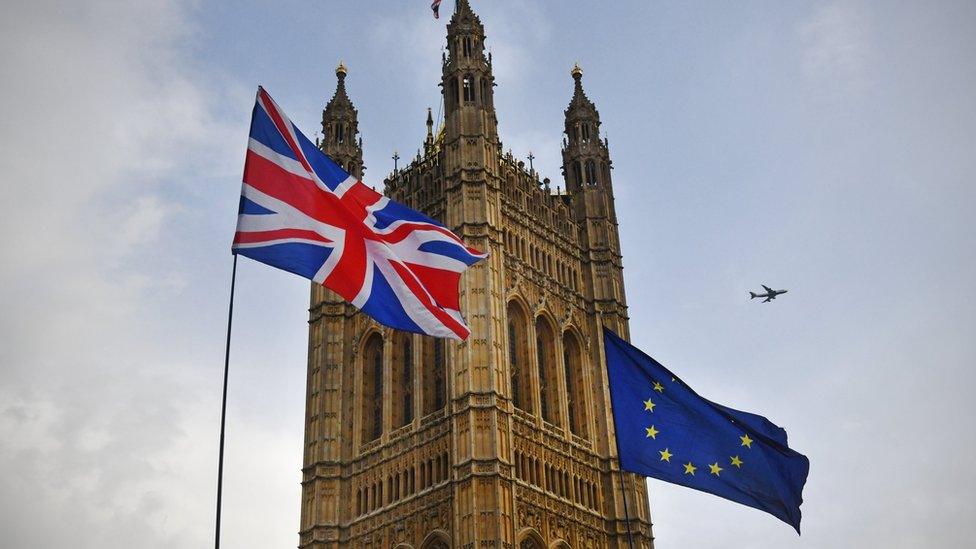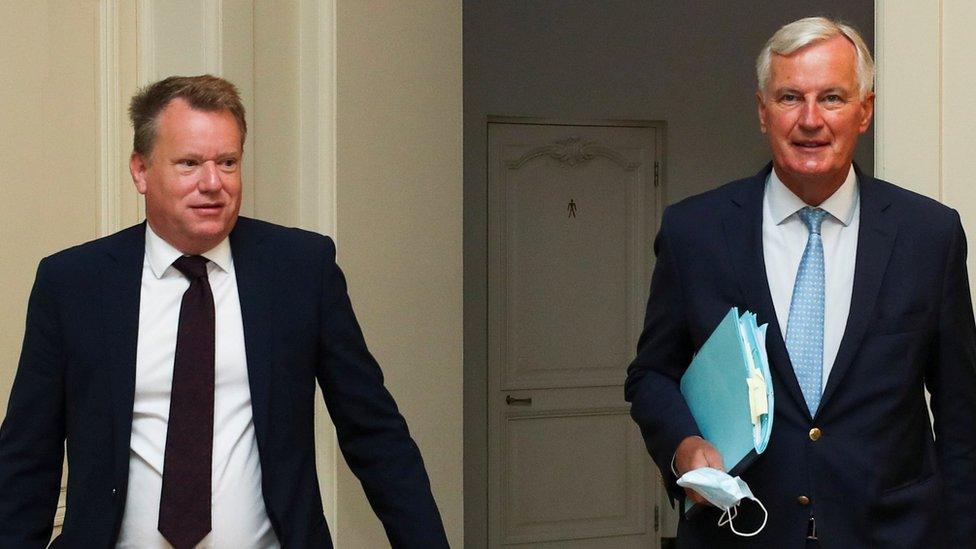Brexit: UK 'ready to welcome EU' to continue trade talks
- Published
- comments

The UK is "ready to welcome the EU team" to continue negotiations over a post-Brexit trade deal, says No 10.
The two sides' chief negotiators, Lord David Frost and Michel Barnier, spoke on the phone earlier after talks stalled last week.
Following the conversation, Downing Street said the pair had "jointly agreed a set of principles for handling this intensified phase of talks".
Lord Frost said talks would begin again in London on Thursday.
The full statement from No 10 said it was "clear that significant gaps remain between our positions in the most difficult areas" and it was "entirely possible that negotiations will not succeed".
But, it added: "We are ready, with the EU, to see if it is possible to bridge them in intensive talks."
Earlier, Mr Barnier said a deal would possible "if we are both ready to work constructively and in a spirit of compromise over the next days, on the basis of legal texts. Time is short."
Both the UK and EU are calling on each other to compromise ahead of the looming December deadline for a deal.
From 1 January 2021, the so-called transition period will be over, which has seen the UK continue to follow EU trading rules while a deal was negotiated.
If an agreement is not reached, the UK will move onto trade with the EU according to the default rules set by the World Trade Organization.
Key areas of disagreement that remain between the two sides include fishing rights and post-Brexit competition rules.
Lord Frost said these "intensive talks" will take place "every day" while the two sides see if a deal can be done.


You could be forgiven for thinking that what we've witnessed over the past few days is a bit of political theatre.
Cover for the government - post chest-beating- to return to the negotiating table where they know the time has now come for tough compromises to be made.
EU leaders also went out of their way to sound tough on Brexit at their summit last week. Privately, a number of EU figures now admit it was a misstep.
But EU leaders play to the domestic gallery too. They wanted to show they were "standing up to the UK" - that leaving the EU doesn't pay and that EU interests would be defended.
They accept they must compromise too now, if this trade and security deal with the UK has a chance of being agreed.
Time is short and trust is in low supply.

The EU had previously set the end of October as a deadline to reach a deal, but Boris Johnson had pledged to walk away if it was not agreed by 15 October.
The day after the prime minister's deadline, Mr Johnson said it was time to "get ready" to leave without a deal, with No 10 going further by saying the talks were "over".
A face-to-face meeting between the negotiators was cancelled for Monday and replaced by a phone call, which still left a stalemate between the two sides.
But Wednesday's conversation appeared to have been more fruitful.

Lord Frost (left) and Mr Barnier (right) have met several times since negotiations began in March
No 10 said Mr Barnier had "acknowledged" the UK's demands for the EU to be "serious about talking intensively, on all issues, and bringing the negotiation to a conclusion" and that he had accepted he was dealing with "an independent and sovereign country".
It also said the EU chief negotiator had accepted "movement would be needed from both sides in the talks if agreement was to be reached".
The statement added: "On the basis of that conversation we are ready to welcome the EU team to London to resume negotiations later this week. We have jointly agreed a set of principles for handling this intensified phase of talks.
"It is clear that significant gaps remain between our positions in the most difficult areas, but we are ready, with the EU, to see if it is possible to bridge them in intensive talks."
Downing Street reiterated its pledge to leave the transition period without a deal - or on "Australian terms" - and called on businesses and travellers to prepare "since change is coming, whether an agreement is reached or not".